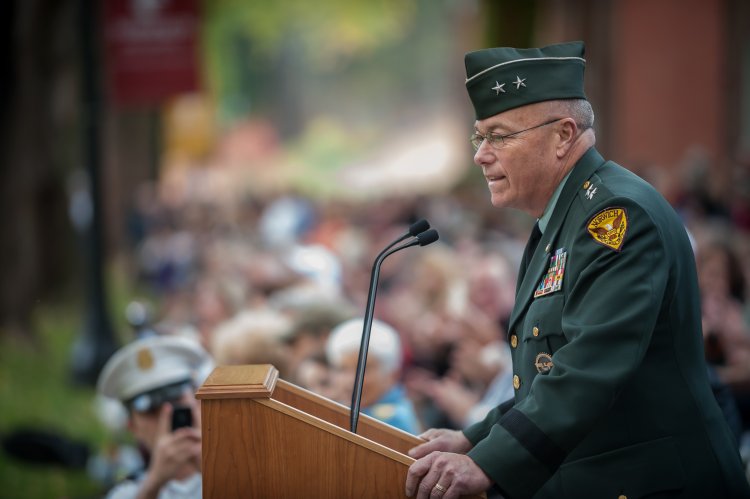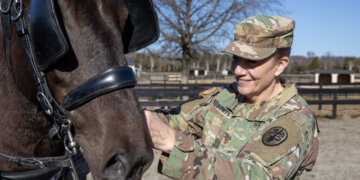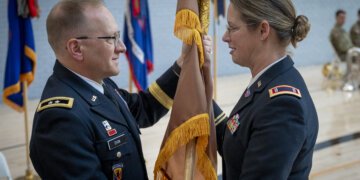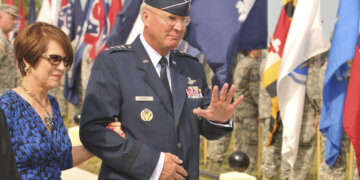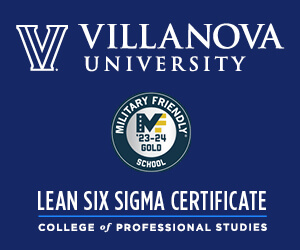A retired Coast Guard Reserve rear admiral will receive an award that “honors a person who exemplifies the traditions of the citizen soldier set by George Washington.”
The Pritzker Military Museum and Library will present the award in October to retired Rear Admiral Dr. Richard W. Schneider, a career coastie and lifelong academic who attributes the honor to his roots.
Schneider’s story of service begins long before graduating from the Coast Guard Academy in 1968. In fact, his true journey to serving in America’s oldest seagoing service started more than 100 years ago.
“My hero was my grandfather on my mother’s side,” he said. “At 14 years old, he ran away to sea from Scotland with his brother in the early 1900s. He came to America for a better life.”
Schneider’s grandfather enlisted for six months in the Coast Guard. After just three months, the work was too much and he gave his uniform to his brother in order to complete the obligation.
“In those days they didn’t care as long as they had an able-bodied seaman,” he laughed.
His grandfather eventually became a ship captain in the Merchant Marines. Though his grandfather loved being a “merchie,” he’d be called back to service.
“World War I broke out and the Navy grabbed him up, making him a lieutenant commander on the spot with a ship,” he said.
Following the Great War, he continued to serve with the Merchant Marines until World War II.
This time, the Navy made him a captain.
“They sent him to help plan the invasion of Normandy because he was from Scotland and knew all the ins and outs of the harbors,” Schneider said.
His grandfather sank one of the first German U-Boats, earning the Navy Cross.
Schneider said that at one point his grandfather was rescued by the Coast Guard.
“He told me that I wouldn’t be alive without them because your mother would have never been born,” he said. “I was around 12 years old when he told me and it made a big impact.”
Growing up with these stories led him to apply for the Coast Guard Academy because, Schneider said, he owed his life to the service. He was initially listed as an alternate, but received a telegram acceptance a week before class started with 24 hours to decide. Since he’d been slated as an alternate, he’d already accepted a spot in the Merchant Marine Academy.
“I told my dad to write a telegram to the Coast Guard that I was coming and write to the Merchant Marines that I wasn’t,” he said.
Schneider felt he had to work hard to earn his last-minute spot, and in 1968 he graduated at the top of his class and as a regimental commander.
A year later, Schneider was assigned to a ship as a gunnery officer. It immediately deployed to the Vietnam War.
After his return, Schneider said he fell in love with academia and earned a Master of Liberal Studies. He was teaching physics at the academy until his wife, Beth, became gravely ill.
In those days, Coast Guard dependents were at the bottom of the list for resources and care, especially where he was near Fort Eustis, he said.
Beth died at just 40 years old. With four young daughters to raise, he transitioned into the Coast Guard Reserve after eight years of active service.
“You can’t go to sea and just leave four little kids at home alone,” he said.
Schneider went to work for the University of Delaware, earning his Ph.D. in public policy while he was a professor. From there, he went to Drexel University as a vice president in 1986, all while continuing his service in the Coast Guard Reserve.
One military academy took notice.
“Norwich University came looking for me because they found I was an academic with an earned Ph.D., had teaching experience and I also had military experience,” he said with a smile. “They asked me to be their president and I loved it there for 28 years.”
The nation’s oldest private military academy was founded more than 200 years ago by a retired Army captain who was disappointed with the educational trajectory he was seeing.
A West Point graduate himself, it was Alden Partridge who originated the “long grey line” we see today. Norwich also is the birthplace of ROTC.
So, what did everyone think of a coastie in charge of what was thought of as a soldier’s academy? Initially, it wasn’t well received.
“I got hate mail for the first three years from the Army guys,” Schneider laughed. “Now they all love me and it’s fine, but it was not fine in the beginning.”
Not only did he grow on the alumni and ardent supporters of Norwich University, but he himself discovered a second shot at love with his now wife of 22 years, Jamie. In 1998, he retired from service after 30 years of service.
In 2020, he was ready to say goodbye to his role as president, too. His retirement from Norwich University was a momentous occasion considering how fewer than 5% of the nation’s college presidents serve more than 20 years.
Schneider’s dedication to his students, education and the military were noticed by the historic Pritzker Military Museum and Library. On Oct. 21, he’ll be recognized for a lifetime of service.
“What the Pritzker did to honor me with this national citizen soldier award, even though I’m a coastie, just wow,” he said.
“His tenure and dedication to sacrifice and service, both at this higher education institution, which is the birthplace of the Reserve Officers’ Training Corps (ROTC), and as a member of the military community, showcases his embodiment of the citizen soldier ideals – duty, sacrifice, service before self, courage and patriotism. We are proud to honor his legacy and achievements,” Susan Rifkin, chief operating officer of Philanthropic Activities, stated in a press release.
The inaugural recipient of the award was former Sen. Bob Dole, a World War II veteran, who received the honor in 2020.



